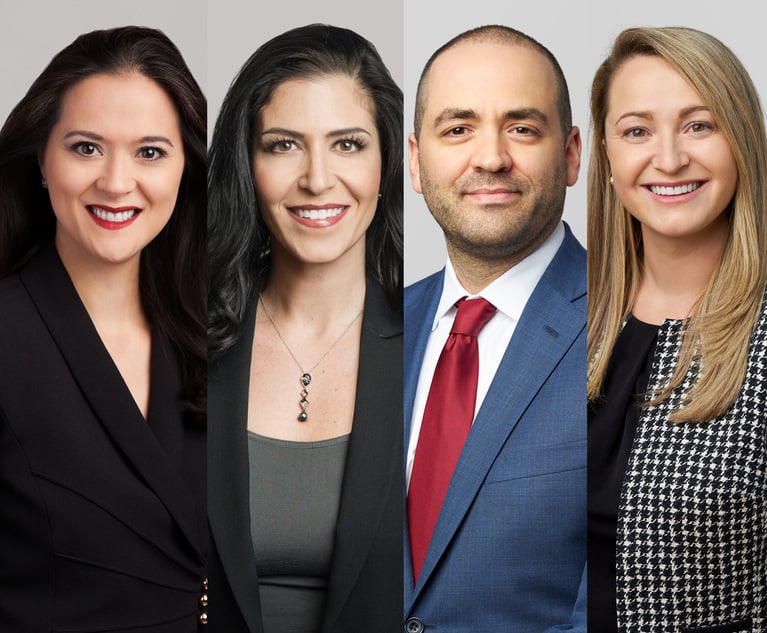After 'Feel of the Case' Repeal, Supreme Court Seeks Amici on Additur and Remittitur
The court will accept briefs through Dec. 17 that are submitted with amicus motions on specific questions concerning computation of additur and remittitur.
November 09, 2018 at 11:49 AM
4 minute read
 Richard J. Hughes Justice Complex (Courtesy photo)
Richard J. Hughes Justice Complex (Courtesy photo)
The New Jersey Supreme Court has issued a call for amicus briefs in the pending appeal of an auto injury case that could generate new rules for additur and remittitur.
The court said in a notice to the bar issued Wednesday that it is inviting motions for amicus participation in Orientale v. Jennings, A-43-17. The court will accept briefs through Dec. 17 that are submitted with amicus motions on specific questions concerning computation of additur and remittitur.
The court has invited supplemental briefing on four questions:
- Should both parties have the right to object to a trial court's additur, or should only the defendant have that right?
- Should both parties have the right to object to a trial court's remittitur, or should only the plaintiff have that right?
- In additur, should the court set the damages amount as the lowest amount reasonably supported by the record, or a reasonable amount supported by the record?
- In remittitur, should the court set the damages amount as the lowest amount reasonably supported by the record, or a reasonable amount supported by the record?
The injured plaintiff in the case, Barbara Orientale, received a $200 verdict from a Middlesex County jury on her underinsured motorist claim against Allstate New Jersey Insurance Co. after the other driver paid her his $100,000 policy limit.
The trial judge, Phillip Paley of Middlesex County Superior Court, found the $200 award was a miscarriage of justice and determined that $47,500 was the lowest verdict a reasonable jury could have returned, given the proofs, so he added $47,300 to the $200. Paley's decision was guided by He v. Miller, a 2011 state Supreme Court case which held that a trial judge deciding a remittitur motion should rely on the judge's feel of the case, based on personal knowledge of verdicts from private practice, as well as comparable verdicts submitted by the parties.
Orientale appealed, claiming the judge should have based the additur on the comparable verdicts she supplied. But the Appellate Division affirmed Paley's award, finding he properly relied on the feel of the case.
In September 2016, while the appeal was pending at the Supreme Court, the justices issued another decision on remittitur, Cuevas v. Wentworth Grp., which repealed the feel of the case doctrine from He v. Miller.
At the Supreme Court, Orientale asserts that a trial judge cannot give an additur under Cuevas when there were multiple injuries to multiple body parts requiring multiple surgeries because then the trial judge would have to become the fact-finder.
Christina Vassiliou Harvey of Lomurro, Munson, Comer, Brown & Schottland in Freehold, argued for Orientale at the Supreme Court on Oct. 9.
The justices did not seek litigants' permission before putting out a call for amicus input, Harvey said. But she believes the procedure will be helpful.
Harvey said in a brief to the Supreme Court that the justices should follow prior Appellate Division rulings and impose the highest reasonable verdict when calculating an additur.
But the attorney for the respondents, Darrin Jennings and Allstate, said the Appellate Division correctly affirmed that additur was the proper remedy. The respondents argued that a careful review of Cuevas reveals that the fundamental principles governing additur and remittitur were not rejected, contrary to Orientale's claim. The trial court properly utilized additur following the verdict, they argue in a Supreme Court brief.
Frederic Regenye of Kenneth Lipstein's office in Westfield, who represents Jennings and Allstate before the Supreme Court, did not return a call for comment.
This content has been archived. It is available through our partners, LexisNexis® and Bloomberg Law.
To view this content, please continue to their sites.
Not a Lexis Subscriber?
Subscribe Now
Not a Bloomberg Law Subscriber?
Subscribe Now
NOT FOR REPRINT
© 2025 ALM Global, LLC, All Rights Reserved. Request academic re-use from www.copyright.com. All other uses, submit a request to [email protected]. For more information visit Asset & Logo Licensing.
You Might Like
View All
On the Move and After Hours: Einhorn Barbarito; Gibbons; Greenbaum Rowe; Pro Bono Partnership
4 minute read

Engine Manufacturer Escapes Suit Over NJ Helicopter Crash That Killed Country Music Star
3 minute readTrending Stories
- 1States Accuse Trump of Thwarting Court's Funding Restoration Order
- 2Microsoft Becomes Latest Tech Company to Face Claims of Stealing Marketing Commissions From Influencers
- 3Coral Gables Attorney Busted for Stalking Lawyer
- 4Trump's DOJ Delays Releasing Jan. 6 FBI Agents List Under Consent Order
- 5Securities Report Says That 2024 Settlements Passed a Total of $5.2B
Who Got The Work
J. Brugh Lower of Gibbons has entered an appearance for industrial equipment supplier Devco Corporation in a pending trademark infringement lawsuit. The suit, accusing the defendant of selling knock-off Graco products, was filed Dec. 18 in New Jersey District Court by Rivkin Radler on behalf of Graco Inc. and Graco Minnesota. The case, assigned to U.S. District Judge Zahid N. Quraishi, is 3:24-cv-11294, Graco Inc. et al v. Devco Corporation.
Who Got The Work
Rebecca Maller-Stein and Kent A. Yalowitz of Arnold & Porter Kaye Scholer have entered their appearances for Hanaco Venture Capital and its executives, Lior Prosor and David Frankel, in a pending securities lawsuit. The action, filed on Dec. 24 in New York Southern District Court by Zell, Aron & Co. on behalf of Goldeneye Advisors, accuses the defendants of negligently and fraudulently managing the plaintiff's $1 million investment. The case, assigned to U.S. District Judge Vernon S. Broderick, is 1:24-cv-09918, Goldeneye Advisors, LLC v. Hanaco Venture Capital, Ltd. et al.
Who Got The Work
Attorneys from A&O Shearman has stepped in as defense counsel for Toronto-Dominion Bank and other defendants in a pending securities class action. The suit, filed Dec. 11 in New York Southern District Court by Bleichmar Fonti & Auld, accuses the defendants of concealing the bank's 'pervasive' deficiencies in regards to its compliance with the Bank Secrecy Act and the quality of its anti-money laundering controls. The case, assigned to U.S. District Judge Arun Subramanian, is 1:24-cv-09445, Gonzalez v. The Toronto-Dominion Bank et al.
Who Got The Work
Crown Castle International, a Pennsylvania company providing shared communications infrastructure, has turned to Luke D. Wolf of Gordon Rees Scully Mansukhani to fend off a pending breach-of-contract lawsuit. The court action, filed Nov. 25 in Michigan Eastern District Court by Hooper Hathaway PC on behalf of The Town Residences LLC, accuses Crown Castle of failing to transfer approximately $30,000 in utility payments from T-Mobile in breach of a roof-top lease and assignment agreement. The case, assigned to U.S. District Judge Susan K. Declercq, is 2:24-cv-13131, The Town Residences LLC v. T-Mobile US, Inc. et al.
Who Got The Work
Wilfred P. Coronato and Daniel M. Schwartz of McCarter & English have stepped in as defense counsel to Electrolux Home Products Inc. in a pending product liability lawsuit. The court action, filed Nov. 26 in New York Eastern District Court by Poulos Lopiccolo PC and Nagel Rice LLP on behalf of David Stern, alleges that the defendant's refrigerators’ drawers and shelving repeatedly break and fall apart within months after purchase. The case, assigned to U.S. District Judge Joan M. Azrack, is 2:24-cv-08204, Stern v. Electrolux Home Products, Inc.
Featured Firms
Law Offices of Gary Martin Hays & Associates, P.C.
(470) 294-1674
Law Offices of Mark E. Salomone
(857) 444-6468
Smith & Hassler
(713) 739-1250







